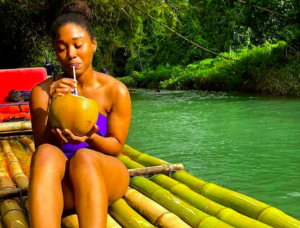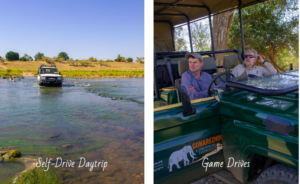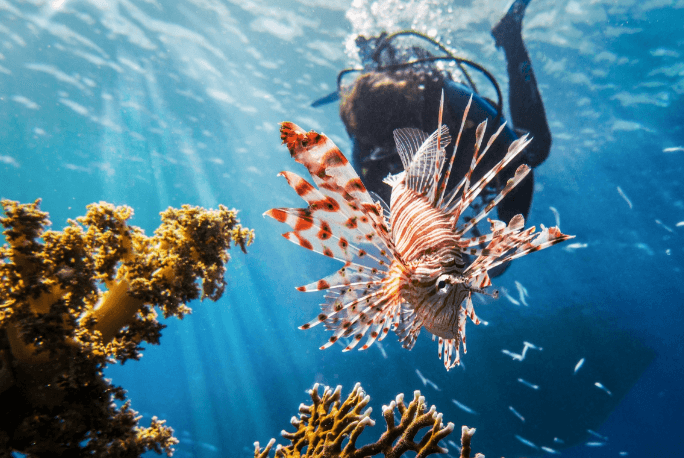
What is Scuba Diving?
Scuba diving is a water sport that includes exploring underwater areas with specialised equipment. “Scuba” stands for “self-contained underwater breathing apparatus,” and it refers to the equipment that allows divers to breathe underwater. Individuals may explore the undersea environment, study marine life, and enjoy the beauty of coral reefs, shipwrecks, caverns, and other underwater attractions through scuba diving.
Under the glistening surface of our planet’s seas is an enchanted realm that has long captivated adventurers, scientists, and nature aficionados. Scuba diving, a sport that allows us to explore the underwater environment, provides an unprecedented opportunity to connect with the deep’s secrets. In this blog article, we will go deep into the world of scuba diving, investigating its attractiveness, necessary equipment, the thrill of undersea encounters, and the significance of responsible diving. We have articles on Some of the best scuba dive spots can be found in Malta, USA, and best winter scuba destinations.
What are the Essential Equipments for Scuba Diving?
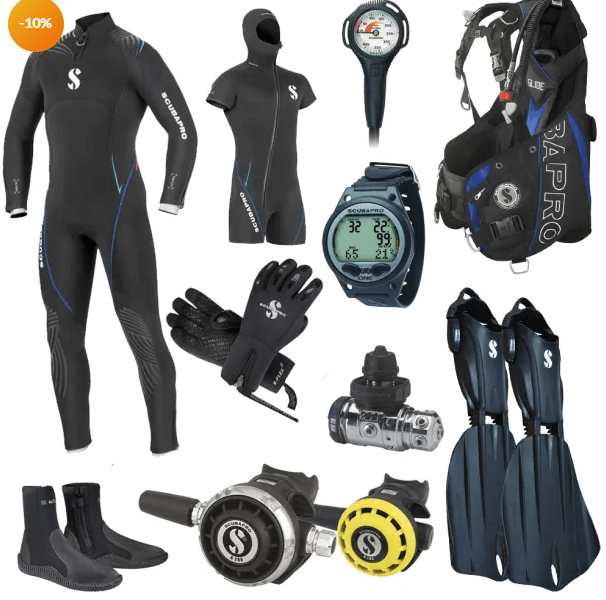
Diving Equipment:
Divers use a wetsuit or drysuit to keep warm, a mask to see underwater, fins to propel themselves, and a buoyancy control device (BCD) to manage their depth. The scuba tank, which holds compressed air or a breathing gas combination, is the most important piece of equipment. A regulator supplies the diver with air, while a depth gauge and pressure gauge aid in monitoring depth and air supply.
Training:
Individuals often get training and certification from recognised organisations such as the Professional Association of Diving Instructors (PADI) or Scuba Schools International (SSI) before beginning scuba diving. This course includes fundamental diving skills, safety procedures, and theoretical understanding of underwater ecosystems and diving mechanics.
Safety:
Scuba diving safety is of the utmost importance. Divers learn about decompression sickness, underwater navigation, emergency procedures, and how to deal with various scenarios that may happen while diving. Buddy diving is a frequent safety practise in which divers are teamed up to assist each other in an emergency.
Dive Preparation:
Divers plan their descent and ascent before each dive, taking into account elements like as dive time, depth, underwater currents, and the requirement for decompression pauses. Dive tables, dive computers, and numerous applications make planning easier.
Environmental Concerns:
Divers are urged to practise ecologically responsible diving. This includes not touching or harming marine creatures, avoiding coral reefs, and cleaning up any garbage or waste found while diving.
Scuba diving allows people to explore and enjoy the amazing and diverse underwater habitats that occur in the world’s oceans, seas, lakes, and other bodies of water. It’s a popular leisure activity, but it’s also used for scientific, commercial, and military purposes, such as underwater research, salvage operations, and military reconnaissance.
Tips for scuba diving beginners
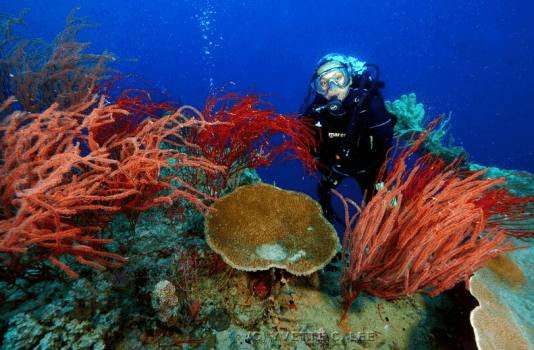
Scuba diving is an exciting and gratifying hobby, but it’s critical to prioritise safety and develop the necessary skills if you’re new to it. Here are some pointers for first-time scuba divers:
Obtain Certification:
Before diving, take a scuba diving certification course from a respected organisation such as PADI, SSI, NAUI, or another. These courses give necessary information, skills, and safety instruction.
Select an Appropriate Dive Centre:
Choose a reputable diving shop or centre with knowledgeable instructors. Check internet reviews or ask experienced divers for advice to verify they maintain safety requirements.
Get the Right Equipment:
While some dive shops rent equipment, investing in your mask, snorkel, and fins for a proper fit is recommended. Rent the remaining items until you’ve gained more expertise and a better grasp of your preferences.
Maintain Good Health and Fitness:
Make sure you’re in good health and fit. In some situations, a pre-dive medical examination may be required. Physical preparation can improve your diving experience and safety.
Understand and learn about your equipment:
Take the time to learn how your scuba equipment works. Learn how to use your mask, BCD, regulator, and other equipment. Regular maintenance is essential for ensuring the dependability of the gear.
Equalize Your Ears:
As you fall, the pressure in your ears rises, causing discomfort. Learn how to equalise the pressure in your ears and sinuses by squeezing your nose and softly breathing through it.
Master Buoyancy Control:
Proper buoyancy control is vital for avoiding environmental damage and ensuring a safe dive. To become a more efficient and responsible diver, practise your buoyancy abilities.
Make a Dive Schedule:
Always plan your dives ahead of time, taking into account aspects like as depth, dive time, currents, and entry and departure places. Dive with a partner and plan your dive before getting into the water.
Keep an eye on your air supply:
Keep an eye on your air gauge and never go above your limitations. Ascend when your oxygen supply reaches the halfway mark or when your dive computer says it’s time.
Relax and remain calm:
Anxiety may have an impact on your diving experience. To keep calm underwater, practise deep, steady breathing. Remember that the undersea world is a peaceful place; take advantage of it.
Remain Hydrated:
Dehydration might increase your chances of getting decompression sickness. Stay hydrated before and after your dives, but avoid drinking too much fluid just before a dive.
Be Wary of Marine Life:
Approach aquatic life with caution and reverence. To avoid causing harm to coral reefs, avoid touching or harassing animals.
Stay Informed:
Maintain current knowledge of dive safety practises, legislation, and new advances in the diving business. Continuing education can help you improve your skills and knowledge.
Listen to Your Instructor:
Pay attention to your instructor’s directions and follow them. They have the expertise and skills to keep you secure.
Exercise your emergency procedures:
Learn and practise emergency measures including as sharing air with a buddy, using a backup air supply, and ascending in an emergency.
Remember that scuba diving is a skill-based sport that improves with practise. Begin with basic dives and work your way up to more difficult ones as you acquire expertise and confidence. Most essential, have fun, appreciate the underwater environment, and always prioritise safety.
The Elegance of Scuba Diving:
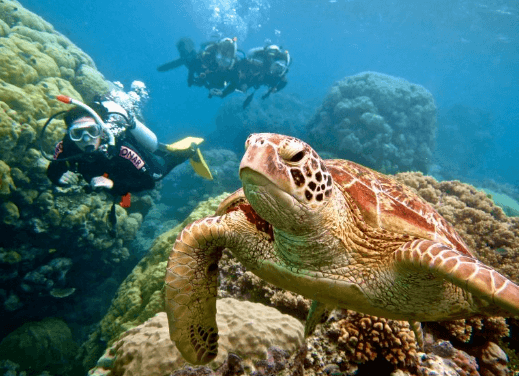
Scuba diving has a certain fascination that draws individuals from all walks of life into its aquatic embrace. Here are some of the reasons why this sport has captured so many people’s hearts and minds:
Uncovering Secret Worlds:
Consider floating weightlessly in a tranquil underwater environment surrounded by vibrant coral reefs, schools of fish, and exotic marine life. Scuba diving helps us to discover secret worlds that would otherwise be unavailable to the general public.
Getaway to Tranquilly:
The undersea environment provides a sense of calm and a getaway from the rush and bustle of daily life. The tranquillity of the underwater world, combined with the rhythmic sound of one’s own breath, offers a one-of-a-kind meditation experience.
Bonding with Nature:
Scuba divers have the unique opportunity to interact with a wide range of aquatic wildlife, from lively dolphins to beautiful sea turtles. These experiences cultivate a profound respect for the beauty and fragility of maritime environments.
The ability to experience the astounding richness of marine life is one of the most enjoyable parts of scuba diving. Each dive offers a different thrill, from bright coral gardens rich with fish to encounters with spectacular species such as manta rays and sharks. Photographers and nature enthusiasts find unlimited inspiration beneath the waves, documenting and sharing moments of beauty with the globe.
The Importance of Safe Diving:
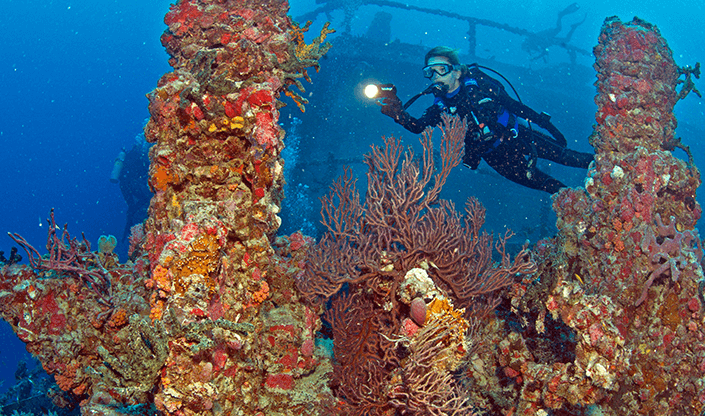
We are caretakers of the underwater world as scuba divers, and with that comes the obligation to maintain and preserve it.
Responsible diving practises include the following:
Respecting Marine Life:
Touching or disturbing aquatic species can harm both the animals and their delicate ecosystems.
Trash Collection and Disposal:
Nothing but images are taken, and nothing but bubbles are left. Collect and responsibly dispose of any garbage or debris observed during dives.
Aiding Conservation Efforts:
Participate in local cleanup projects and join organisations committed to marine protection.
FAQs About Scuba diving for beginners
What exactly is scuba diving?
Scuba diving is a water sport that includes exploring underwater surroundings while inhaling compressed air or a breathing gas combination from a tank.
Is it necessary for me to be a strong swimmer in order to scuba dive?
While basic swimming skills are required, you are not need to be an Olympic swimmer. You should feel at ease in the water and be able to tread water and swim short distances.
Is scuba diving risky?
When done appropriately, with adequate training, equipment, and respect to safety requirements, scuba diving may be safe. Divers should also be conscious of their own physical and mental limitations.
How can I acquire my scuba diving certification?
To become a qualified scuba diver, you must first finish a scuba diving certification course from a respected organisation such as PADI, SSI, NAUI, or another. Classroom lessons, pool training, and open water dives are common.
What scuba diving equipment do I need?
A mask, snorkel, fins, wetsuit or drysuit, buoyancy control device (BCD), regulator, scuba tank, depth gauge, and pressure gauge are all necessary scuba diving equipment. Other accessories may also be utilised.
How deep can a scuba diving beginner go?
To enhance safety and minimise dangers connected with deep diving, most novice dives are confined to depths of 18-30 metres (60-100 ft). Your depth restrictions will be determined by your certification level.
How long can I remain underwater when diving?
The duration of a dive is determined by factors such as your rate of air consumption and the depth of the dive. Recreational dives often take 30 minutes to an hour, however this might vary.
What exactly is decompression sickness (DCS), and how do I avoid it?
DCS, often known as “the bends,” is caused by the formation of nitrogen bubbles in the body during fast ascent. Divers must ascend carefully, make safety pauses when required, and follow the guidelines on their dive tables or dive computers to avoid DCS.
Can I dive if I have a medical condition?
Some medical issues can impair your ability to safely scuba dive. If you have any medical difficulties, you must check with a dive physician before beginning your training or resuming diving.
What should I do if I run out of oxygen during diving?
If you run out of air, signal your dive partner gently and ascend to the surface while sharing your buddy’s alternate air supply (octopus). During your certification training, you should learn about emergency ascension protocols.
Is there an age limit for scuba diving?
Many certifying organisations provide junior diver programmes for youngsters as early as ten years old. However, age regulations may vary, and children may require parental consent.
What are the world’s top diving destinations?
There are other fantastic diving locations across the world, including Australia’s Great Barrier Reef, the Maldives, the Red Sea, and the Galápagos Islands. The greatest diving destination is determined by your interests and preferred type of diving.
Do I have to buy all of my diving equipment or can I rent it?
Most dive shops lend their equipment, making it easy for novices. However, many divers eventually purchase their own equipment for the sake of comfort and familiarity.
Is scuba diving popular for underwater photography?
Underwater photography is, indeed, a popular component of scuba diving. Many divers like photographing marine animals and underwater scenery. For this reason, specialised underwater cameras and housings are available.
Can I scuba dive if I’m afraid of sharks?
Shark encounters are uncommon, and the majority of shark species are not harmful to people. If you are afraid of sharks, you may still enjoy scuba diving in many locales without coming into contact with them.
Related posts.


